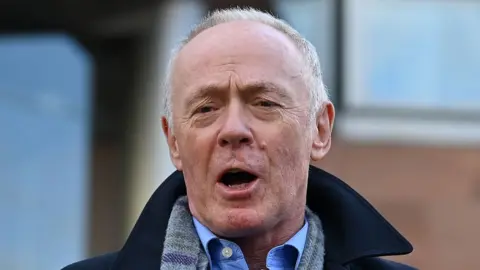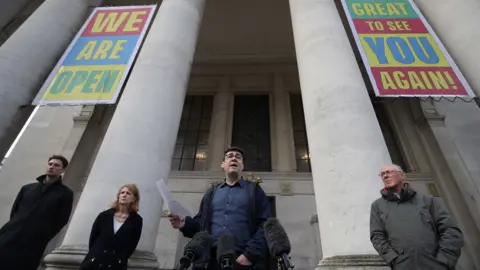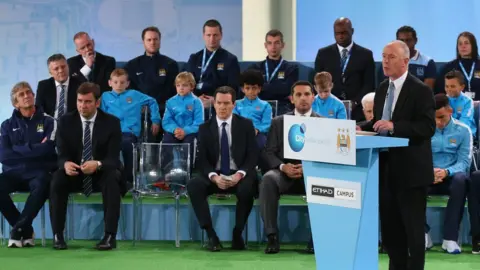Sir Richard Leese: Manchester City Council boss to quit after 25 years
 Getty Images
Getty ImagesThe leader of Manchester City Council has announced that he will step down after 25 years in the role.
Sir Richard Leese, who will leave the post on 1 December, said the decision reflected his "personal priorities for the next few years".
The Labour politician oversaw a landmark period in the city's history, including the 2002 Commonwealth Games and the 2017 Manchester Arena attack.
Council chief executive Joanne Roney described him as "a towering figure".
In an interview with the Manchester Evening News, Sir Richard said he wanted to spend more time with his grandchildren, adding: "I don't want to do 60-hour weeks and 12-hour days."
Greater Manchester Mayor Andy Burnham said his Labour colleague was "an inspiration" who had "shown incredible leadership" and always "put Manchester first".
"He has had one of the biggest impacts that any politician I can think of has made. If you think of the city in terms of the early to mid-90s and Manchester today - that's the difference Sir Richard Leese has led," he said.
Mr Burnham said Greater Manchester was "immeasurably stronger" and Sir Richard had "been at the heart of that".
He added: "A quarter of a century on the frontline of politics is tough. He and I have been there together at difficult moments."
These included the Manchester Arena bombing and being "side-by-side" lobbying the government over proposed coronavirus restrictions, he said.
 Getty Images
Getty ImagesSir Richard, a former teacher and youth worker, was elected to the city council in 1984.
He became leader in May 1996, a month before the IRA planted a huge bomb outside the Manchester Arndale shopping centre, which was timed to coincide with the Euro 96 football tournament.
No-one was killed in the explosion although many people were injured.
Sir Richard was involved in the consequent transformation of the city, which had already been selected to host the 2002 Commonwealth Games.
The games boosted the city's international profile and kick-started the transformation of East Manchester, involving the construction of the stadium which is now home to Manchester City FC.
He was knighted in 2006, a year before Manchester International Festival was established to showcase new works by artists from across the world.
 Getty Images
Getty ImagesSeen as one of the most powerful Labour politicians in England, Sir Richard signed up to the devolution deal, which saw more powers shifted from central government to regional authorities.
In May 2017, he was appointed as deputy mayor of Greater Manchester under the leadership of Mr Burnham.
A few weeks later, the city was targeted by a suicide bomber who killed 22 people at a concert in Manchester Arena.
Since then, Sir Richard has also been involved in the response to the coronavirus pandemic and was a critic of the government's handling of regional lockdowns last autumn.
Announcing his resignation, he said his "commitment to the city and the city region remains undiminished".
"It has been an enormous privilege to serve the people of Manchester over this period of time and my heartfelt thanks goes to the thousands of people who have worked with us over the last 25 years."
Lucy Powell, Labour MP for Manchester Central, tweeted that he was "the giant of local government and local leadership".
"His oversight of the transformation of our city - in so many different ways - leaves a huge and powerful legacy that will be unmatched for a very, very long time."

Why not follow BBC North West on Facebook, Twitter and Instagram? You can also send story ideas to [email protected]
